
ANT 4930:008/IDH 4930:007
Current Class Meeting Time: 01/2018 – 04/2018
SOC 37/TGH ED
Course Application
Technical Standards
COURSE INSTRUCTORS
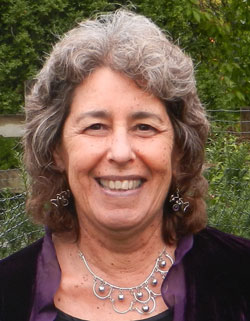
Roberta Baer, PhD
SOC 138, Office Hours: Wednesday 1-2 & by Appointment
Phone: (813) 974-0005
email: [email protected]
Note: This is the only email account I have—I do not have a mail.usf.edu account.This may come up automatically on your mail account, but it is not a real account.
 If you need to contact Baer, use her email. She does not check Canvas for messages – if you contact her that way, she will NOT receive your message.
If you need to contact Baer, use her email. She does not check Canvas for messages – if you contact her that way, she will NOT receive your message.
Jason W. Wilson, MD, MA
TGH 2034K, Bayshore Pavillion
Directions to Office at this link
Phone: (813) 843-2110
Office Hours: Book an office hour appointment at this link
email: [email protected], [email protected]
GRAD ASSISTANT: Seiichi Villalona 862-686-7257
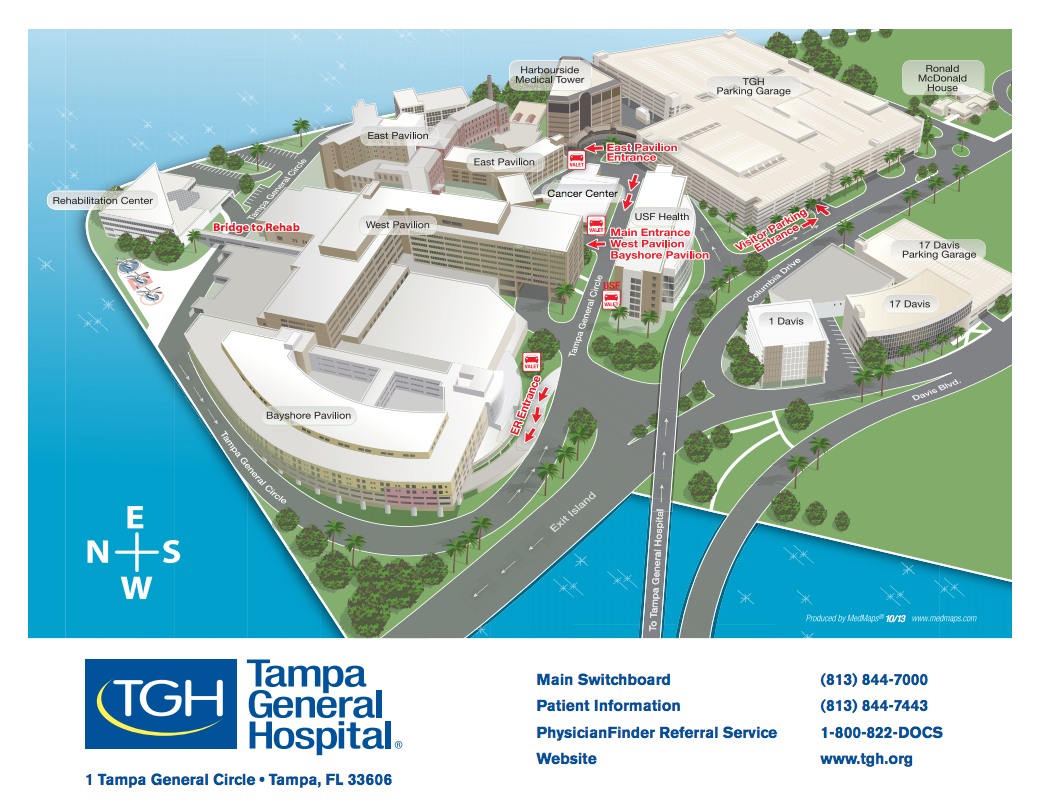
DOWNLOAD SYLLABUS IN PDF FORMAT HERE
Physician Shadowing Sign Up Sheet
GSW PATIENT ALERT SYSTEM
GROUP.ME will be used for notification of all GSWs arriving at TGH. If you are on-call, you need to respond to the GROUP.ME notification within 30 MINUTES. If you do not respond, the patient will opened to the rest of the student group. You should always see a patient as a group of 2 students. If no other student is available, the on-staff research assistant should accompany you for the interview. You will conduct the interview and they will take notes.
If the patient is Spanish speaking or speaks another language, please use video interpretation on your smart phone. Follow these instructions in order to do this:
Cyracom on iPhone App Store
Cyracom on Google Android Store
- Download the Cyracom Application on your phone
- Login = [email protected]
- Password = tghtgh1
If you have not done it please log on to thi.teamhealth.com and get it done. It takes only a few minutes and it is essential as the score will follow you through your career. The deadline is today Feb 19. Remember that for translation you can download the cyracom app to your phone.
The login is [email protected] Password: tghtgh1 This is much easier to use than the vocera connection or the blue phone. You can also make video calls for a number of the languages.
Research Assistants: Please download the Group.Me app and make sure Seiichi adds you to the GSW Alert Group. If a patient arrives in the ED that is resuscitated and stable, please send out a notification to the group letting the group know that a patient is available. Also, please let the class know which students have priority by referring to the GSW Availability schedule.
Group.ME iPhone App iTunes App Store Group.ME Android Play App Store
“The course pushed me to thinking outside of the box and into new perspectives…While putting together all of the research the class has done this semester has been hectic, it has also been one of the most satisfying experiences of my life” – Student
Roberta Baer and Jason Wilson were featured on the Anthro Alert Podcast about this course in October 2017.
Some of the insights from the faculty and students follow:
“Our explicit goal in this class was to train pre-medical students to have a better understanding and valuation of the patient perspective in the physician-patient encounter. These issues are at the core of the subfield of applied medical anthropology…While students were required to shadow physicians, they were also required to shadow patients, which we have learned is a key activity in developing an understanding of the patient experience. The class used what they learned to put together a leaflet for patients about common misunderstandings of how the Emergency Room works, and then evaluated the perceptions of the leaflet. Reflection activities about their experiences were also required” – Baer
Previous Student Quotes:
“The course pushed me to thinking outside of the box and into new perspectives…While putting together all of the research the class has done this semester has been hectic, it has also been one of the most satisfying experiences of my life” – Student 2017
“Never could I have imagined what this class would teach me about medicine and about myself… Despite dreading the 4 hour patient shadowing assignment since syllabus day, looking back, it was probably my favorite assignment of the class… Mainly the patients taught me that their health wasn’t something separate from their lives. Their health was something that affected them every day and really influenced the person they had come to be, and how the interactions they would have in the ER would impact their coming days and weeks.” – Prior Student
Download the Firearm Questionnaire
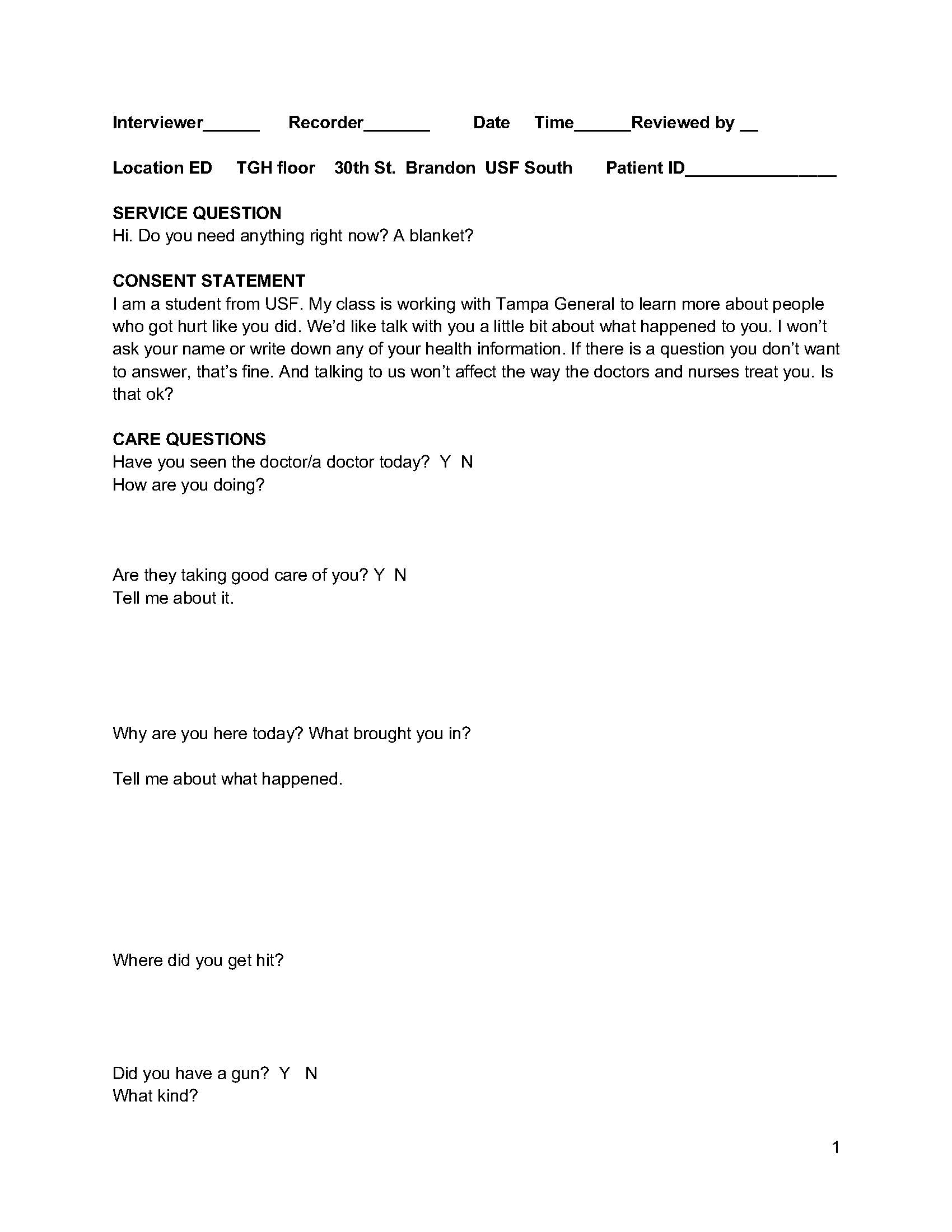
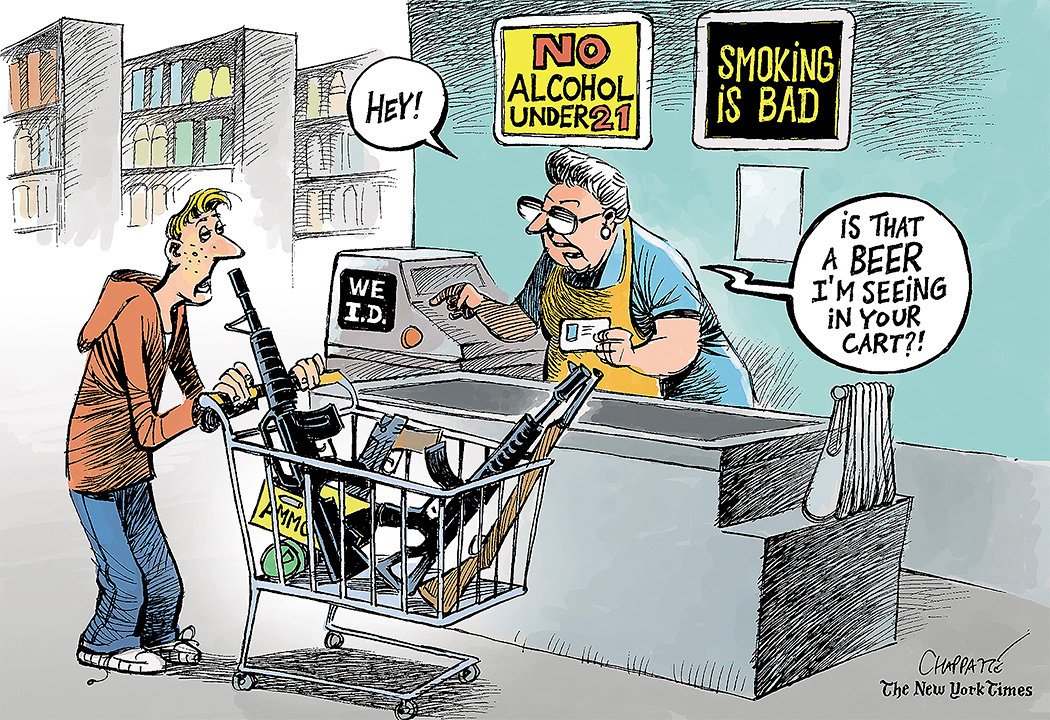 Updated Readings – News Clips and other Items that come up during course
Updated Readings – News Clips and other Items that come up during course
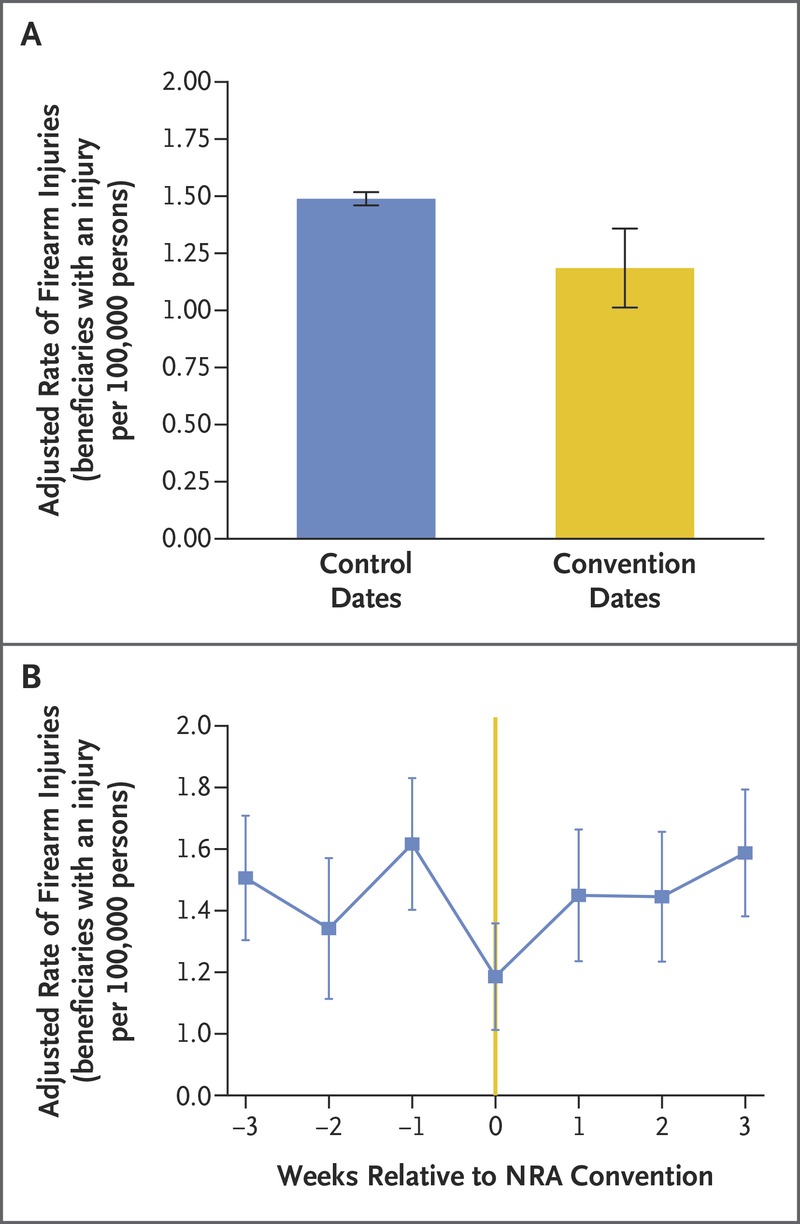
Reduction in Firearm Injuries
During NRA Annual Conventions
NEJM. 2018.
COURSE RATIONALE:This course is designed for USF students who plan a career as physicians. It will focus on the importance of physician-patient interaction and communication and patient advocacy. Students will learn the importance of the patient’s perspective, and that physicians and patients have different perspectives. Students will also get training and experience in basic qualitative research methods, as well as content on medical anthropological research on aspects of physician-patient interaction and communication. Student will participate in an actual group research project at TGH over the course of the semester.This course will contribute to the students in a number of ways:
Students will also get training and experience in basic qualitative research methods, as well as content on medical anthropological research on aspects of physician-patient interaction and communication. Student will participate in an actual group research project at TGH over the course of the semester.This course will contribute to the students in a number of ways:
- Expose the students to people of differing backgrounds (USF global citizenship goal)
- Involve undergraduate students in actual research (USF undergraduate research goal)
- The student’s research findings will be given back to the community (USF community engagement goal).
- Students will be better prepared to undertake their own individual honors research projects (USF student success goal).
COURSE OBJECTIVES: This course will provide an opportunity for students who anticipate a career as physicians or physician assistants to participate in an actual study of physician-patient communication and interaction. Students will read background material on the importance of physician-patient communication and interaction, patient advocacy, as well as on qualitative research techniques, and research ethics. They will design a group research project on the topic, collect and analyze the data, and on the last day of class, present the report to representatives of the Emergency Department of Tampa General Hospital, where the research will be carried out. This experience will prepare the student to carry out individual research, as well as to become better health care providers.
This course will provide an opportunity for students who anticipate a career as physicians or physician assistants to participate in an actual study of physician-patient communication and interaction. Students will read background material on the importance of physician-patient communication and interaction, patient advocacy, as well as on qualitative research techniques, and research ethics. They will design a group research project on the topic, collect and analyze the data, and on the last day of class, present the report to representatives of the Emergency Department of Tampa General Hospital, where the research will be carried out. This experience will prepare the student to carry out individual research, as well as to become better health care providers.
LEARNING OUTCOMES: Students will be able to:
- Describe problems in physician-patient interaction and communication.
- Describe why patient-physician communication and patient advocacy are important.
- Understand key issues in ethical aspects of research in health settings
- Plan and conduct a qualitative research study in a health setting
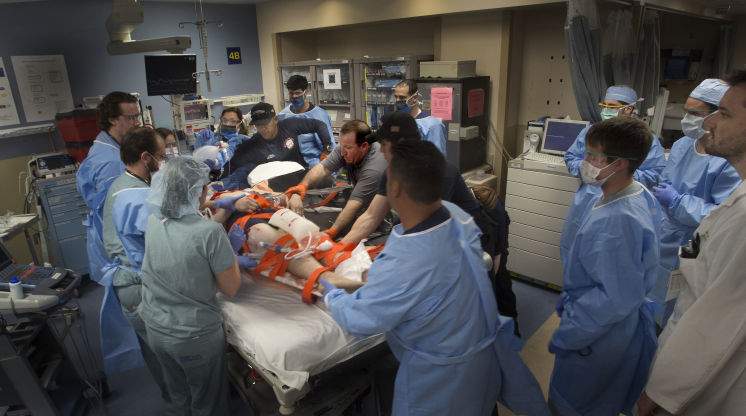
INCOMPLETE AND S/U GRADES: Incomplete grades will be given only under highly unusual circumstances. Students should refer to university policy regarding conditions and procedures for incomplete. S/U can only be taken by non-majors. Deadline for choosing S/U is no later than one week after the last day to add classes.
ABSENCE FOR ATTENDANCE PROFESSIONAL MEETINGS: The instructors will attend conferences at times during the semester. Students will be notified in advance and guest lectures or films will be scheduled for those class periods.
BOMB THREATS: In case of a bomb threat, class will meet in front of the Faculty Office Building at the regularly scheduled time. From there, we will proceed to an alternate location. Bomb threats will not affect dates of examinations or due dates of assignments.
ACADEMIC HONESTY/DISHONESTY: You are required to commit yourself to academic honesty including abstaining from cheating, plagiarism, and other acts of academic dishonesty including misrepresentation and fabrication. There will be no excuses accepted for any form of cheating. The USF policy is: USF REGULATION -3.026 ACADEMIC INTEGRITY OF STUDENTS. It can also be found at http://www.ugs.usf.edu/catalogs/0708/adadap.htm..If you are caught participating in any act of academic dishonesty, you will be reported to the Chair of the Anthropology Department. You will receive an F for the assignment and possibly an FF grade for the course.
ATTENDANCE POLICY: Attendance will not be taken, but class participation is a part of the student’s overall grade (see below). Students who miss a class for whatever reason have the obligation to contact classmates to catch up on material.
SALE OF NOTES OR TAPES: Not permitted.
DISABILITY ISSUES: Any student with a disability is encouraged to meet with me privately during the first week of class to discuss accommodations. Each student must bring a current Memorandum of Accommodations from the Office of Student Disability Services which is prerequisite for receiving accommodations. Students in need of academic accommodations for a disability may consult with the office of Students with Disabilities Services to arrange appropriate accommodations. Students are required to give reasonable notice prior to requesting an accommodation. Accommodated examinations through the Office of Student Disability Services require two weeks notice. All course documents are available in alternate format if requested in the student’s Memorandum of Accommodations.
RELIGIOUS HOLIDAYS: Any student who will miss class due to a religious holiday must notify the instructor in writing by the end of the second week of classes.
EMERGENCY ISSUES: In the event of an emergency, it may be necessary for USF to suspend normal operations. During this time, USF may opt to continue delivery of instruction through methods that include but are not limited to: Blackboard, Elluminate, Skype, and email messaging and/or an alternate schedule. It’s the responsibility of the student to monitor Blackboard site for each class for course specific communication, and the main USF, College, and department websites, emails, and MoBull messages for important general information.
REQUIREMENTS AND GRADING: The grade for this course will be based on:
Class participation/field notes 25%
CITI course on research ethics/HS forms 5%
Essay Sets/Reflection on class project) 40%
Group report on class project 30%
Only under highly unusual circumstances will late papers be accepted (if these have been discussed in advance with the instructor). Permission for late submission of required work must be substantiated by medical or other appropriate documentation. All papers and essay sets must be typed. Assignments will not be accepted by email unless prior permission from the instructor has been obtained. However, drafts of all assignments will be accepted by email for Baer’s feedback prior to the due date for submission. However, instructor review of a draft does not mean that the draft is perfect or necessarily an “A” paper.Grades in this class will be “A+,” through “F” (i.e., letter grades and “+’s” and “-‘s”). Assignment and course letter grades will be based on a standardized score with “A” awarded for 93.4-100; “A-” for 90-93.3; “B+” for 86.7-89.9; “B” for 83.4-86.6, “B-” for 80-83.3; “C+” for 76.7-79.9; “C” for 73.4-76.6; “C-” for 70-73.3; “D+” for 66.7-69.9, “D” for 63.4-66.6; and “D-” for 60-63.3.The class project: This class incorporates a group research project at the TGH ED. Students will participate in the design of the study focus, create the data collection instruments, analyze the data, and prepare and present a report on their findings.Students will be each assigned 2 blocks of participant observation. One participant observation block (3 hours) will be with an assigned physician in a shadowing capacity (after class meeting Feb. 9). Students will sign up in class Feb. 9 for a time slot, which will indicate the name of the physician they are to shadow. Upon arriving, they are to ask for this physician and report to the pod where that physician is working. Do this before March 2. The other block will be based in the TGH ED waiting room (after class meeting Feb. 9). Students should spend on hour at the security desk watching arrival and processing, one hour at the pivot desk, and one hour in the waiting room, observing and talking informally with patients (especially those they’ve “met” at the pivot desk. Each participant observation block will be 3 hours (6 hours total).Students will also be assigned to follow two patients, follow the patient through their visit, and then interview the physician who treated that patient (in class March 23). The patient following will take place during assigned 4 hour shifts with a specific physician (sign up for this in class March 16. They will go to the pod where their assigned physician is working. They will interview a patient as assigned by the physician. This is a new patient who hasn’t yet been seen. The student will follow the patient to everything; plan for this to take 4 hours for each patient. After each session of participation observation/shadowing, the student will write and turn in fieldnotes on their experiences.The class project will involve a study of patients who have been shot. Each student will interview 2-3 patients and conduct the class interview with them. This interview will take place either in the ER, TGH hospital floor or the 30th St. clinic (preferably while the patient is waiting to be seen). For the later 2 locations, consult the class schedule to arrange to interview one of these patients. Each student is responsible to 2-3 interviews; however, when possible, all interviews should be done in pairs, so each student actually gets to sit in on 4-6 interviews.
NOTE: You cannot go to TGH/30th St. Clinic to do shadowing or interviews unless you have signed up on the class Google calendar!!!
COURSE OUTLINE Jan. 12 Class 1 Class meets at USF
- Review Syllabus
- Social Determinants of Health and Health Disparities
- Case, Anne, and Angus Deaton. 2017 Mortality and Morbidity in the 21st Century.
Read abstract, review tables in main article (p. 397-439), read section “Cumulative Disadvantage” (p. 429-439). - Kershaw, K. et al. 2017 Association of Changes in Neighborhood-Level Racial Segregation with Changes in Blood Pressure among Black Adults. JAMA Internal Medicine 177(7):996-1002.
- Hoffman, J. Sick and Afraid, Some Immigrants Forgo Medical Care. New York Times.
- Anderson et al. 2016 Addressing Social Determinants of Health from the Emergency Department through Social Emergency Medicine. Western Journal of Emergency Medicine, XVII(4):487-9.
- Discussion on Unnatural Causes: In Sickness and in Wealth—streaming thru USF library—watch it before you come to class.
- Powerpoints on health disparities—shown in class
- Instructions on how to pick up your TGH observer badge–handout
Jan. 19 Class 2 Class meets at TGH ED
- Tour and Orientation to TGH ED
- History and Culture of Emergency Medicine
- Film—24/7/365 63 min.—this is on canvas—watch it before you come to class
- Discussion of Physician and Institutional Perspectives
- IOM 2007 Hospital-Based Care: At the breaking Point.
- Haughton, James G. Emergency Services: Part of the Safety Net? Journal of Public Health Policy 26(3):282-285.
- Project—Gun Violence in the US
- Kristoff, Nicholas. 2017 Opinion/How to Reduce Shootings.
- Human subjects forms handed out
Jan. 26 Class 3 Class meets at USF
-
- Rich, John. Wrong Place, Wrong Time. Trauma and violence in the lives of young black men. Introduction p. 1-5, Chapter 3. Jimmy in the hospital p. 39-67, Chapter 6. A stone in the heart p. 83-110, Conclusion p. 196-201
- Ranney, M. et al.2017 A Consensus –Driven Agenda for Emergency Medicine Firearm Injury Prevention Research. Annals of Emergency Medicine 69(2):227-240.
- Betz, M. et al. 2016 Frozen Funding on Firearm Research. Western Journal of Emergency Medicine XVII(1):91-3.
- Kalesan, B.2017 AJPH Editorial: The Cost of Firearm Violence Survivorshop. AJPH 107(5):638-9.
- Gani, F et al. 2017 Emergency Department Visits for Firearm-Related Injuries in the US, 2006-14. Health Affairs 36(10):1729-1738.
- Bernstein, D. 2017 Americans Don’t Really Understand Gun Violence. https://www.theatlantic.com/politics/archive/2017/12/guns-nonfatal-shooting-newtown-las-vegas/548372/
Qualitative data collection - Angrosino, Projects in Ethnographic Research, Ch. 2, p. 11-22.
- Angrosino, Doing Ethnographic and Observations Research, Ch. 3, p. 28-34.
- Ethical Issues in Research with Human Subjects—JW ppt on HIV paper
- Human Subjects Forms discussions and assignment
- Protection of Risk to Human subjects and the Ethics of EthnographicFieldwork. In Designing and Conducting Ethnographic Research Ethnographer’s Toolkit, Book 1. M. LeCompte and J. Schensul. AltaMira Press, 2010, pp. 285-317.
- CITI assignment given
Feb.2 Class 4 Class meets at USF
-
-
- Medical Anthropology–Read Ebola Culture and Politics
- Health Care Issues
- NYTimes. 2015 Health Care Systems Try to Cut Costs by Aiding the Poor and Troubled.
-
The Patient Perspective
- Film—The Waiting Room (2012/ 1 hr 21 min.) Watch this via canvas before class.
- Gordon, J. et al. The patient experience in the emergency department: a systematic synthesis of qualitative research. International Emergency Nursing 18:80-88.
- Roscoe, L. and E. Eisenberg. 2016 The Role of Patients’ Stories in Emergency Medicine Triage. In press, Health Communications.
Feb. 9 Class 5 Class meets at USF Cultural Issues
- Weaver, Charlotte, and David Sklar. 1980 Diagnostic Dilemnas and Cultural Diversity in Emergency Rooms. Western Journal of Medicine133:356-366.
- CITI assignment due.Discussion of CITI assignment
Participation observation - Crane and Angrosino Ch. 5
- Bernard, H. Russell 2011 Research Methods in Anthropology, 5th edition. Altamira Press, Lanham, Md. Ch. 14
Fieldnotes
Key Informants
-
- In-depth, Open-Ended Exploratory Interviewing. In Essential Ethnographic Methods, Ethnographer’s Toolkit Book 3, J. Schensul and M. LeCompte, AltaMira Press, 2013, pp. 135- 170.
- Homework: Participant observation physician shadowing. Sign up for your day and time in class.
- Homework: Participant observation in the TGH ED waiting room. Sign up in class for your day and time.
-
Feb.16 Class 6 Class meets at TGH
- Homework:
- Begin patient shadowing in pods. Sign up in class for your day(s) and time(s).Human Subjects’ forms due
- Key Concepts in Medical AnthropologyDisease and Illness, Explanatory Models
- Kleinman, A., et al. Culture, Illness, and Care. Annals of Internal Medicine 88(2): 251-8, 1978.
- Metzl, J. and H. Hansen Structural Competency. Social Science and Medicine 103:126-133, 2014
The Biocultural Perspective
Worldview, Value Orientation
- Galanti, Geri-Ann. “Basic Concepts “and” Conclusions” In Caring for Patients from Different Cultures, 4th edition. Univ. of Pa. Press, Philadelphia, 2008.
- Opala, J and F. Boillot Leprosy among the Limba: Illness and Healing in the Context of World View. Social Science and Medicine 42(1):3-19, 1996.
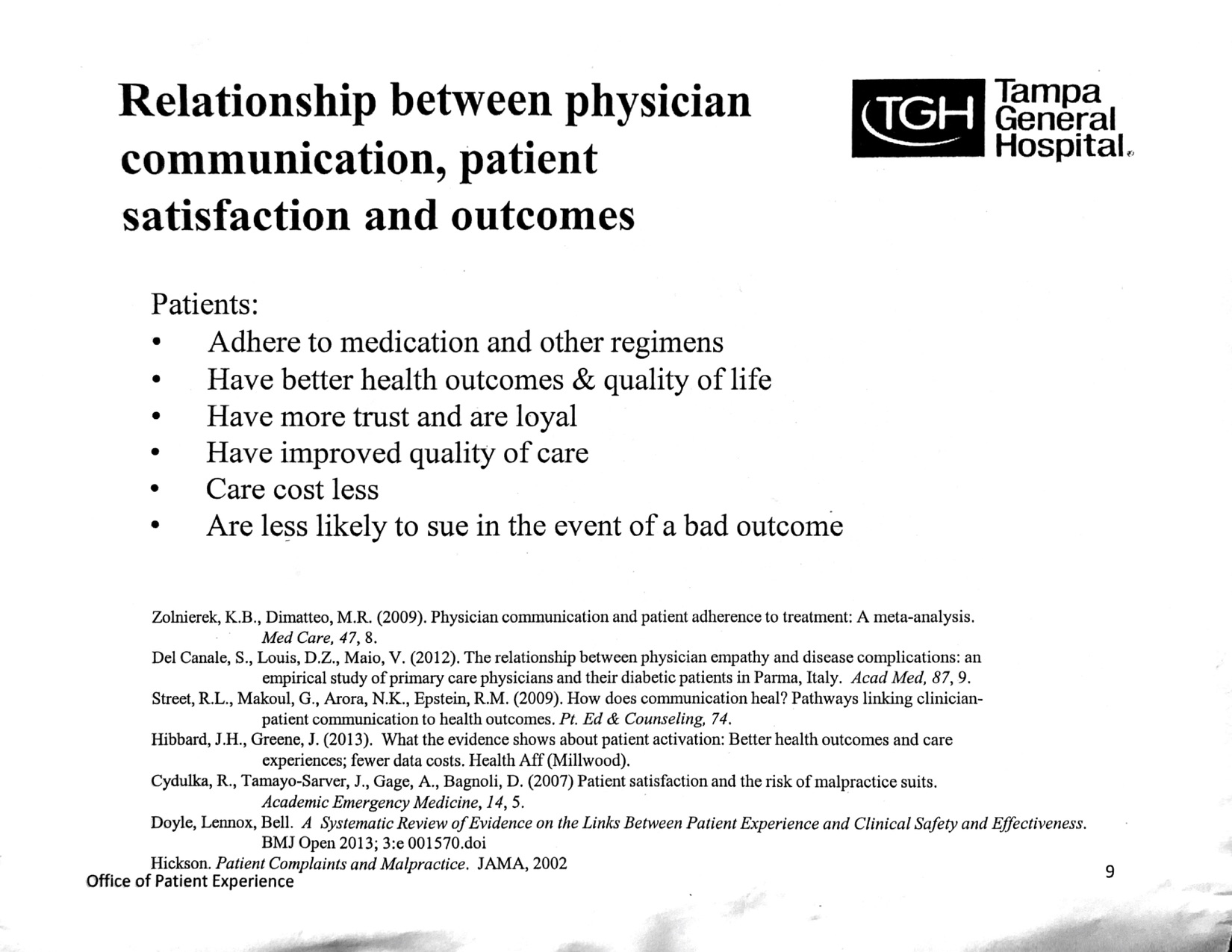
- Powerpoint Handout Available for Download Here. Guest speakers – Karen Hendrickson and Laura Click, Laura Valco – Patient Experience
- TGH PRESS GANEY Patient Experience Handout
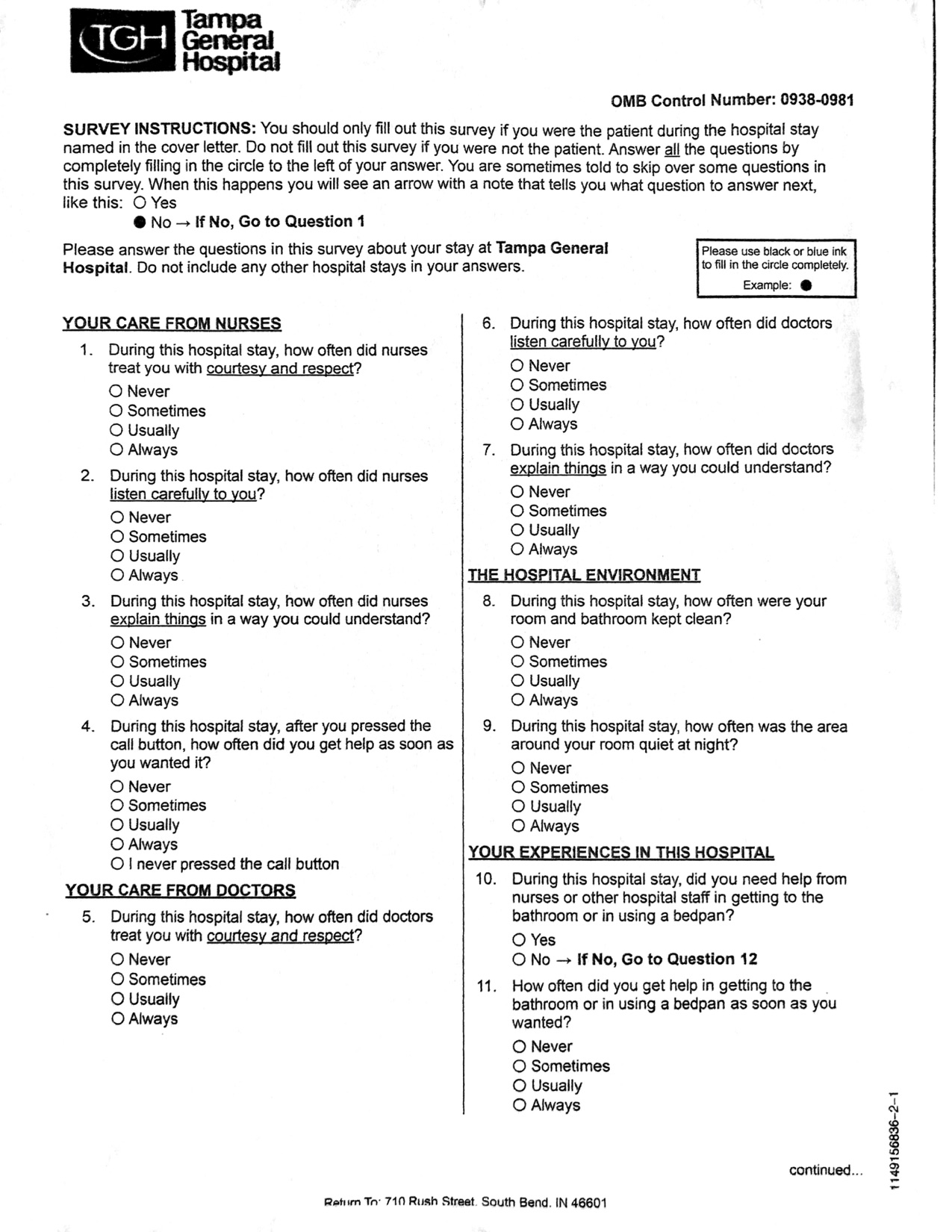
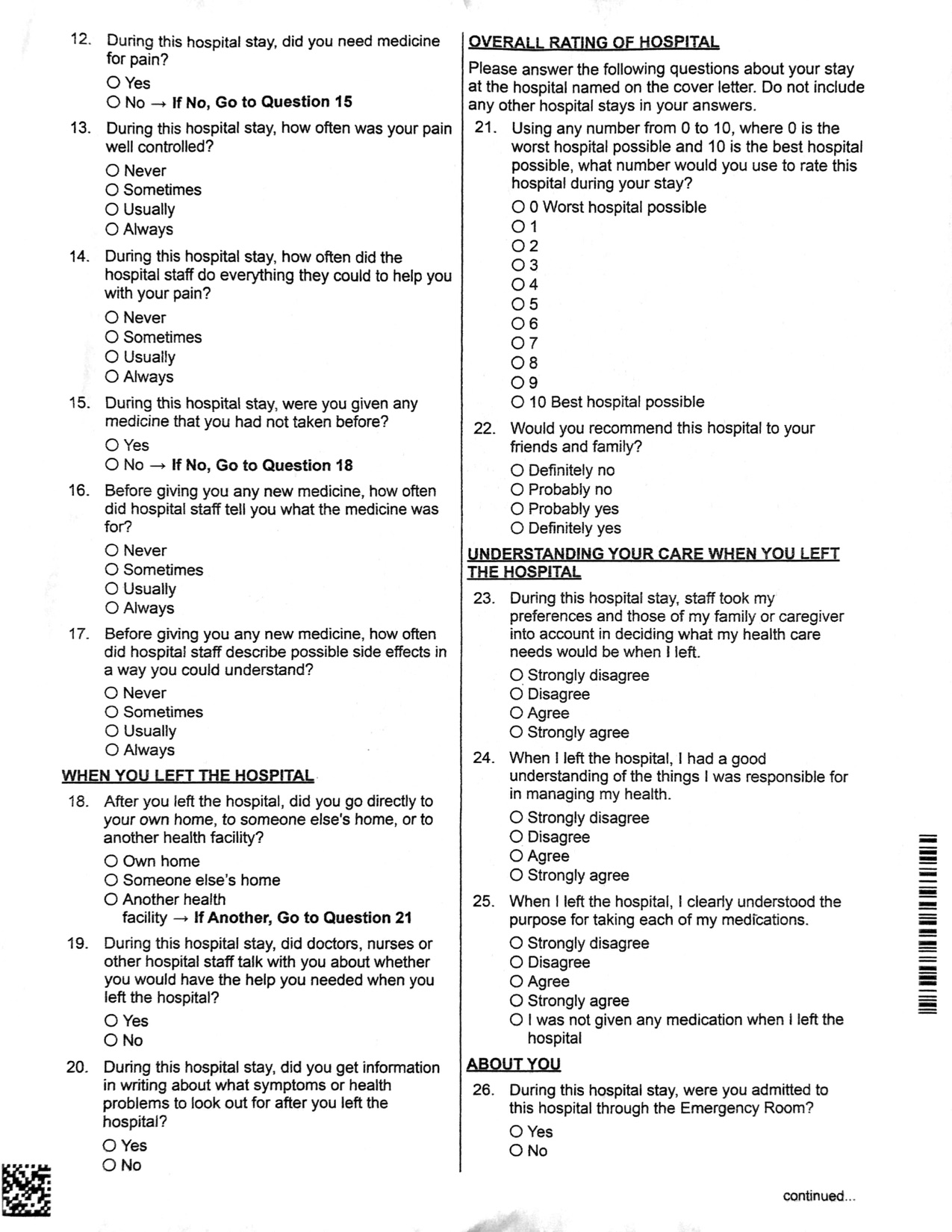
-
Feb.23 Class 7 Class meets at USF
- Discussion of Participant Observation in waiting room.
- WR PO FN due
- Development of Questionnaire
- ED Report—TGH Class reports 2016, 2017
- Increasing Knowledge for the Prevention of Firearm Violence Quantifying Disparities in Urban Firearm Violence by Race and Place in Phila, PA.
Key Med Anth Concepts, cont.
- Biomedicine as a Culture. Hahn, Robert A. Biomedicine as a Cultural System. In Sickness and Healing:An Anthropological Perspective, Yale University Press, pp. 131-172, 1995.
- Payer, Lynn. Cultural Bias in Medical Science, United States: The Virus in the Machine, and Plus Ca Change. In Medicine and Culture: Varieties of Treatment in the United States, England, West Germany, and France, Lynn Paper, ed. New York: H. Holt, pp. 23-34, 124-155, 1988.
-
March 2 Class 8 Class meets at TGH ED
-
- FN of Docs/ Pts shadowing due. Discussion of experience.
- Revision of questionnaire.
- Data collection on gun violence project begins.
Key Med Anth Concepts, cont - Biomedicine as a Culture cont.
- Roter, Debra and J. Hall. Ch 9. – Conseq. of Talk, Ch 10 – Improving Talk through Intervention. Doctors Talking with Patients/Patients Talking with Doctors 2nd ed. Praeger, Westport, CT, 2006.
- Emergency Medicine 60(5):545-553.
- Guest speakers: Seiichi Villalona and Christian Jeannot – Translation/Interpretation of Non-English Speaking Patients
- You Tube clip on interpreters
-
-
March 9 Class 9 Class meets at TGH
- Key concepts in Med Anth, cont
Ethnomedicine- McCombie, S.C. Folk Flu and Viral Syndrome: An Epidemiological Perspective. Social Science and Medicine, 25(9): 987-993, 1987.
- Wood, Corinne Shear. The Traditional Healer: Holistic Healing in Response to Stress of Disease. In Human Sickness and Health: A Biocultural View, pp. 291-334. Palo Alto, CA: Mayfield Publishing Company, 1979.
Interactions with Biomedicine - Hammerschlag, C.A., Page. In The Dancing Healer, Harper and Row, NY, 1988.
- Bastien, J. Cross-Cultural Communication Between Doctors and Peasants in Bolivia. Social Science and Medicine 24(2):1109-1118, 1987.
- Anderson, Barbara Gallatin. An Approach to the Resolution of the Mexican-American Resistance to Diagnostic and remedial Pediatric Heart Care. In Clinically Applied Anthropology, N.J. Chrisman & T.W. Maretzki, eds., Reidel,Dordrecht, pp. 325-350, 1982.
- Guest speaker Robin Atkins, Bloodless Medicine at TGH
-
March16 Spring Break
-
March 23 Class 10. Class meets at TGH ED
- Essay set part 1—due
- Session with ED docs
- Flores, G. et al. Errors of Medical Interpretation and Their Potential Clinical Consequences. Annals of
- Cassell, Joan. Life and Death in Intensive Care, Temple University Press, pp.1-15, 105-117, 155-176, 2005.
- Guest speaker—David Wein—Medicine in New Zealand
-
March 30 Class 11 Class meets at USF.
- Film– Split Horn – 58 min. watch before class.
- O’Connor, B. Hmong Cultural Values, Biomedicine and Chronic Liver Disease.In Healing Traditions, Univ. of PA, Press, Philadelphia, pp. 80-108, 1995.
- Intro to data analysis and excel
- 11:00am-12:20pm: Guest Lecture—Dr. Eisenberg—research on communication issues
-
April 6 Class 12 Class meets at TGH ED
- (R and J and S gone. Mike B. covers class at TGH ED)
- Data due
- Data analysis
- April 13 Class 13 Class meets at USF
- Data analysis
- Essay set part 2 due.
April 20 Class 14 Class meets at USF
- Data Analysis, report preparation.
- Reflection paper due.
April 30 MONDAY Class 15 4-6PM TGH ED Report presentation
“In reality, the majority of people who come to the ER do not have fascinating, rare or life-threatening problems. People come with chest pain, back pain, social pain. They come just in case, or because nowhere else will take them. This causes the true gap in models: expectations. Physicians simply want to make sure someone is healthy enough to leave. Patients want to find out what is wrong with them and fix it." Student 2017
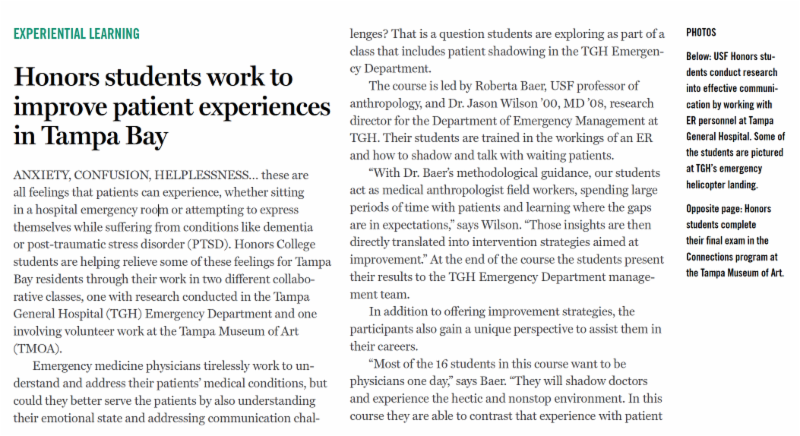
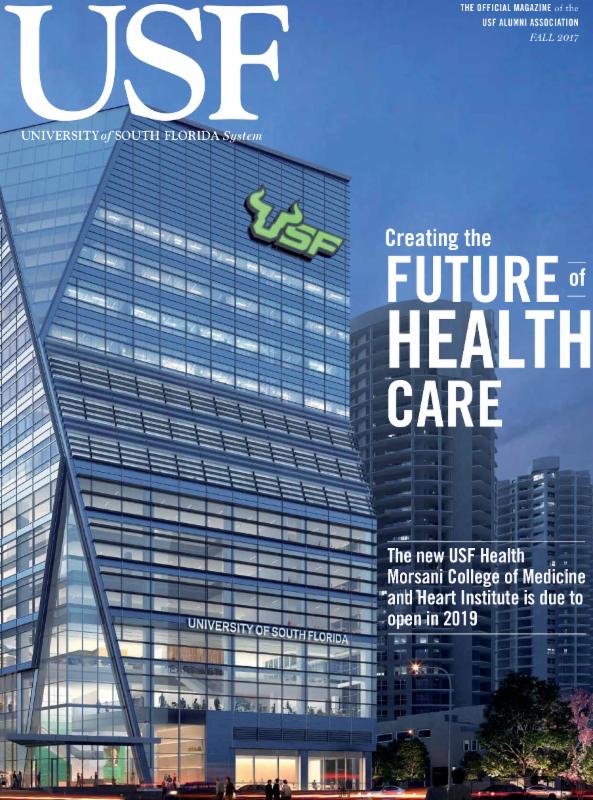
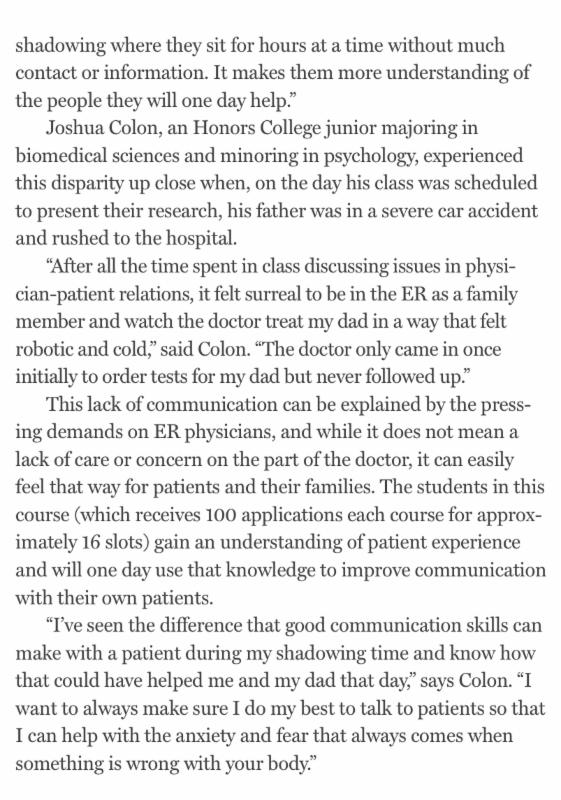
![]()
![]()

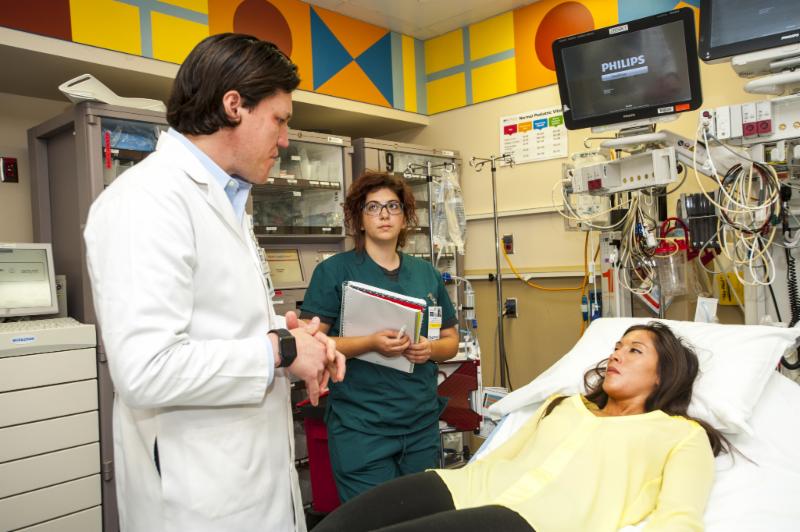
[ngg_images source=”galleries” container_ids=”1″ display_type=”photocrati-nextgen_basic_imagebrowser” ajax_pagination=”0″ order_by=”sortorder” order_direction=”ASC” returns=”included” maximum_entity_count=”20″]